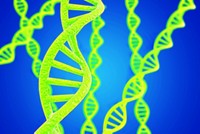Advertisement
Grab your lab coat. Let's get started
Welcome!
Welcome!
Create an account below to get 6 C&EN articles per month, receive newsletters and more - all free.
It seems this is your first time logging in online. Please enter the following information to continue.
As an ACS member you automatically get access to this site. All we need is few more details to create your reading experience.
Not you? Sign in with a different account.
Not you? Sign in with a different account.
ERROR 1
ERROR 1
ERROR 2
ERROR 2
ERROR 2
ERROR 2
ERROR 2
Password and Confirm password must match.
If you have an ACS member number, please enter it here so we can link this account to your membership. (optional)
ERROR 2
ACS values your privacy. By submitting your information, you are gaining access to C&EN and subscribing to our weekly newsletter. We use the information you provide to make your reading experience better, and we will never sell your data to third party members.
Policy
Patenting Human Genes
Innovation: Appeals court overturns ban on gene patents; biotech industry scores victory
by Glenn Hess
August 8, 2011
| A version of this story appeared in
Volume 89, Issue 32
A federal appeals court has ruled that human genes can be patented, overturning a lower court’s decision that involved a widely used genetic test for two types of cancer. The case, which ultimately may be decided by the Supreme Court, has far-reaching implications for biotechnology and pharmaceutical companies.
The 2-1 ruling by a panel of the U.S. Court of Appeals for the Federal Circuit on July 29 reverses a district court decision and supports the right of Myriad Genetics, a Salt Lake City-based biotech firm, to patent two “isolated” human genes, BRCA1 and BRCA2, that account for most inherited forms of breast and ovarian cancers.
The American Civil Liberties Union (ACLU) filed a lawsuit against Myriad in 2009 that sought to have the patents revoked, arguing that genes are “products of nature” and therefore cannot be patented. The suit contends that the patents stifle diagnostic testing and research that could lead to cures and that they limit women’s options regarding their medical care.
In March 2010, U.S. District Judge Robert W. Sweet ruled that Myriad’s patents were invalid, finding that isolated DNA molecules are ineligible for patent protection because they involve a “law of nature.”
But appellate Judge Alan Lourie says that DNA isolated from the body is “markedly different” from DNA inside the chromosomes.
“The ability to visualize a DNA molecule through a microscope, or by any other means, when it is bonded to other genetic material, is worlds apart from possessing an isolated DNA molecule that is in hand and usable,” Lourie writes. “It is the difference between knowledge of nature and reducing a portion of nature to concrete form, the latter activity being what the patent laws seek to encourage and protect.”
Peter D. Meldrum, president and CEO of Myriad Genetics, welcomes the ruling. “We strongly support the court’s decision that isolated DNA and cDNA [complementary DNA] are patent-eligible material as both are new chemical matter with important utilities which can only exist as the product of human ingenuity,” he says.
Paul M. Rivard, a patent attorney in the Washington, D.C., office of Banner & Witcoff, tells C&EN that the decision should be regarded as a huge win for the biotech industry. “The Federal Circuit’s ruling significantly reaffirms settled expectations of the biotech industry by holding that isolated DNA molecules are patent eligible because they are markedly different from DNA as it exists in nature,” he says.
ACLU says it will consult with its clients to decide whether to appeal or seek another remedy. The plaintiffs, which include research and women’s health groups, are likely to ask the full court to rehear the case or seek review by the Supreme Court, which recently has taken an interest in patent cases involving subject matter eligibility, according to Rivard.




Join the conversation
Contact the reporter
Submit a Letter to the Editor for publication
Engage with us on Twitter